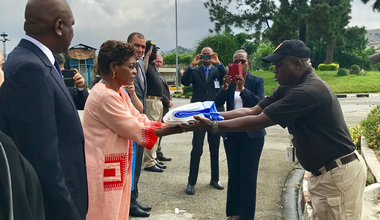UNOCI supports administrative authorities in Lakota to resolve land disputes and manage intercommunity conflicts
"From 31 January to 31 December 2014, Gagoré sub-prefecture in the department of Lakota recorded 109 conflicts, including 85 rural land conflicts. These conflicts were due to land purchase transactions with the traditional leaders which were done without any official or legal document". This was the sad observation made by Yapi Yapi, the deputy prefect of Gagoré in the department of Lakota.
In an effort to resolve this problem, the Civil Affairs Section of the United Nations Operation in Côte d'Ivoire (UNOCI), in collaboration with the deputy prefect, organized a discussion and training workshop for people in Gagoré on 17 and 18 June 2015
More than 100 delegates from Gagoré villages and campsites, villages, communities, leaders of women's and youth associations took part in the workshop.
During the workshop they were trained on rural land laws and how to manage and prevent intercommunity conflicts.
They were taught the role of village leaders, rural land law, conflict prevention and management, young people's contributions and commitments to social cohesion and how to preserve a peaceful electoral environment in 2015.
Following the fruitful discussions during three workshops, village chiefs, women and young people brought their respective contributions to the implementation of the land laws and the strengthening of social cohesion in Gagoré.
The village leaders suggested the establishment of a land law outreach committee composed of the representatives of each community living in Gagoré; the interruption of the sale, prevention of the purchase or leasing of land by any other inhabitant of the village except the head of landowners' family, members of that family and the village chief.
The women, for their part, decided that everyone in Gagoré should be sensitized on land law and pleaded with administrative and traditional authorities to allow women to inherit land like men.
To strengthen social cohesion, they recommended forgiveness, tolerance and work together, regardless of race, ethnicity or political affiliation.
The youths suggested the establishment of a rural land management committee in Gagoré to help their parents have access to land ownership certificate and title deeds.
They also suggested the construction of a youth centre for meetings and discussions to strengthen social cohesion and the establishment of a monitoring and litigation committee. Finally, they pleaded for young people to end the practice of the illegal sale of land in order to avoid conflicts within and between families and communities.
 UN
UN United Nations Peacekeeping
United Nations Peacekeeping




